Introduction
Welcome back to our series on the future of anthropology. For the second session, we spoke with biological anthropologists and archaeologists from different countries and traditions. In the following posts, they reflect on the current moment and what it means for the future of the field.
Dispatches on “the field”
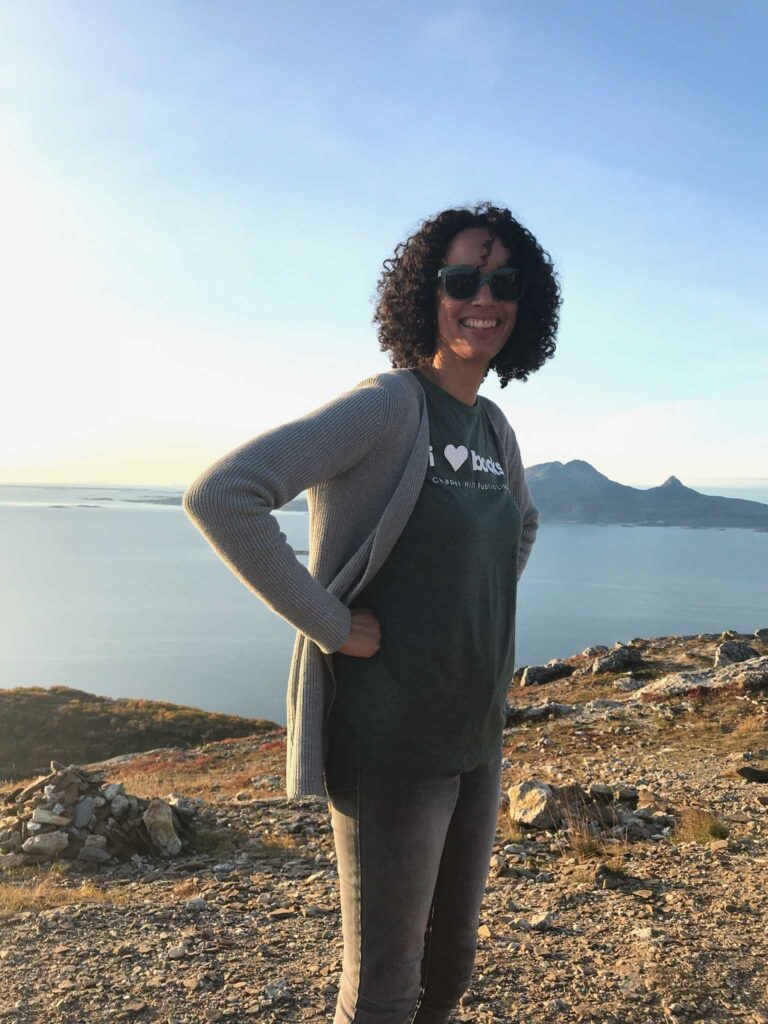
One of my first reactions, when asked about the nature of archaeological fieldwork during the Covid-19 pandemic and looking over our prompts, was that “fieldwork” means something quite different for archaeologists than for sociocultural anthropologists. But does it, really?
I’m thinking about the ways that archaeologists have attempted (sometimes successfully) to engage with living people, the descendants of the people who occupied the sites we call our “field,” and the people who now live there. Many archaeologists will now acknowledge that they strive for a practice that is critical, meaningful, and engaged. This kind of scholarship is, as they say, “high touch.” One must talk with people, form relationships, build trust, engage in back and forth negotiations. Does a pandemic in which face-to-face conversation is complicated, if not impossible, up the complexity of this process just enough to cause archaeologists to throw up their hands and give up? Safety restrictions might give cover to those who would rather retreat into a scholarly bubble, and not concern themselves with the living.
Further considering Danilyn and Yael’s charge, I found myself wanting to trouble, or confront, its terms. If we all want to know how to do fieldwork under radically new conditions, it seems wise to spend some time thinking about what we mean by “fieldwork.” Where is “the field?” What we as anthropologists and archaeologists signify by “the field” tells us a lot about our norms and values, the techniques we consider valid, the forms of knowledge that count for us.
“The field” matters so much to us in part because it is a site of enculturation. It may be where stories of the ancestors get passed down. It may be where we form communities in which people not only learn and pursue knowledge together (as we do in a classroom), but in which people also may live side by side, perhaps at some remove from the “real” world.
Some skills and modes of knowledge production that we consider essential are thought to be best learned in “the field.” We share equipment. We pore over one another’s notes. We pass artifacts back and forth, learning to identify and analyze them literally looking over one another’s shoulders. This is not a 6-feet-apart scenario.
What it comes down to, from where I stand, is that some of the aspects of being who we as individual anthropologists, individual archaeologists, are (that is, our roles, our identities, our personae) often emerge from key moments and experiences in the field. The coronavirus pandemic is hindering our ability to inhabit those identities and to teach and learn archaeology as an embodied practice, as a part of ourselves.
And yet, John Jackson has observed, and I concur, that “an anthropologist is always on the clock.” A consequence of the above-mentioned embodiment of disciplinary identity is that we can, potentially, find “the field” anywhere and everywhere that we encounter humans and their material traces. Instead of assuming a fixed relationship between “the field” and a certain kind of site, perhaps we can accept (either because of “these times” or because ”these times” are the crisis that compels our acceptance of) a relational rather than an essentialist definition of our sites, our data, and our processes of data collection—our “fields.” Specifically, I claim that it is the presence of an anthropologist, an archaeologist, that engenders “the field.”
Maybe current conditions mean people can’t study the thing (the location, the collection) that they wanted to, but is it really the thing that we are curious about, or is this thing simply an instantiation of an object that is more abstract? If we can accept the latter orientation, then the inaccessibility of the thing becomes less troubling.
My year of visiting English classrooms in Norway was cut short, but I learned a lot about what English means to young Norwegians (and what it does for them) by observing the use of English on placards at a Black Lives Matter protest in front of the parliament building in Oslo (Figure 1). Eventually, I anticipate analyzing these placards as material things and considering how they compare with the stickers that are widely used to spread political and ideological messages in Norway (Figure 2).
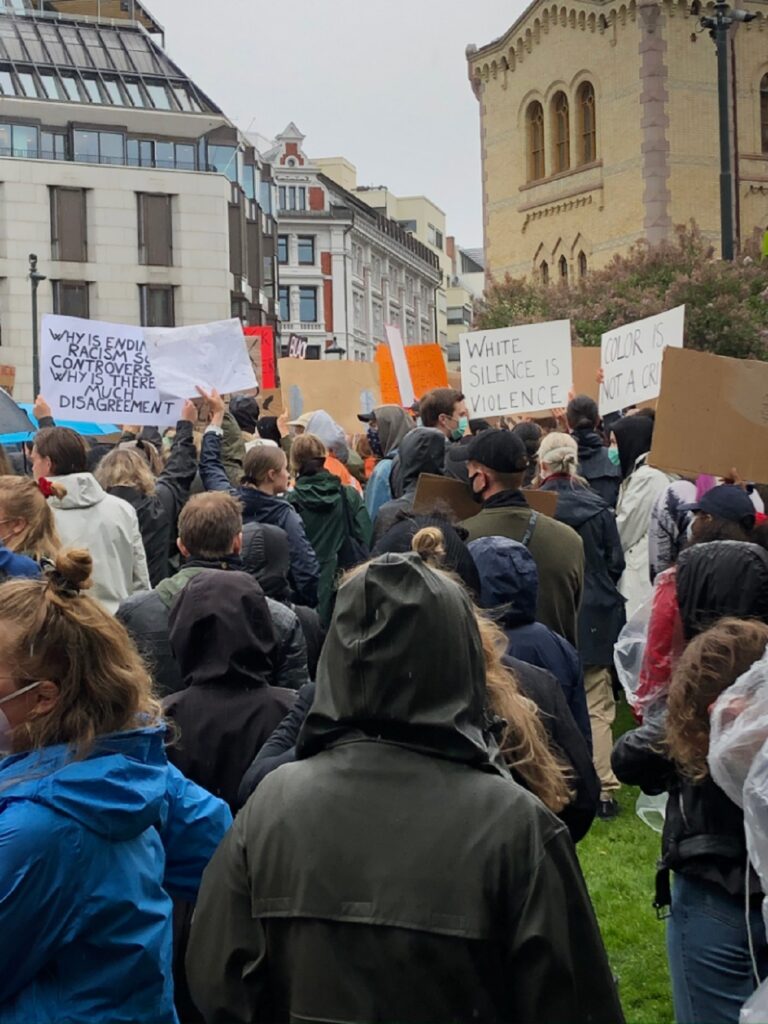

I realize that it’s easier said than done, but a great deal might be accomplished (from reassuring our junior colleagues, to reinvigorating the discipline, to discovering new “fields”) by shifting our thinking from “How can we identify new methods—especially methods of data acquisition—to continue to do the same work under the conditions of a pandemic?” to the question posed in the prompt: How will the conditions of a pandemic shape the kinds of questions anthropologists can ask?
As I walked around Oslo during the shutdown, I found myself curious about the new proxemics that was emerging. I started to observe people navigating shared spaces as the fear of contagion or the wish to protect others has changed the rules of the game. I found myself thinking about the material apparatus of social (some prefer the term “physical”) distancing: the plexiglass shields at counters; the tape on the floor telling you where to stand; and the extent to which people paid attention to these new cues for behavior—when, why, who? Passing through the liminal spaces of four international airports, I had an opportunity to reflect on the modes and materials of protection taken up by different national and intra-national social groups. Now, sitting at home in North Carolina under quarantine, I’m following with great interest the endless discussion of what a mask means.
I still wonder, though, given the structures within which we operate, even if emergent or precariously-employed scholars were willing and able to “pivot” their research, to study stickers, protest placards, and inspirational chalk art instead of ancient inscriptions, posthole patterns, and pots, would it be an act of solid mentorship to encourage them do so, knowing all of the extra value that is attributed to a business-as-usual field experience?
Because, of course, we are not perfectly autonomous actors. We are constrained by the social structures within which we work and live. Consider those for whom the sign-vehicle “the field” evokes meaning (Figure 3).[1] How is that entity (a funding agency, a university promotion committee, a dissertation chair) situated within the structure of anthropology, of the academy? How is that entity situated in relation to the archaeologist attempting to assert that “the field” can, should, or does signify something new?
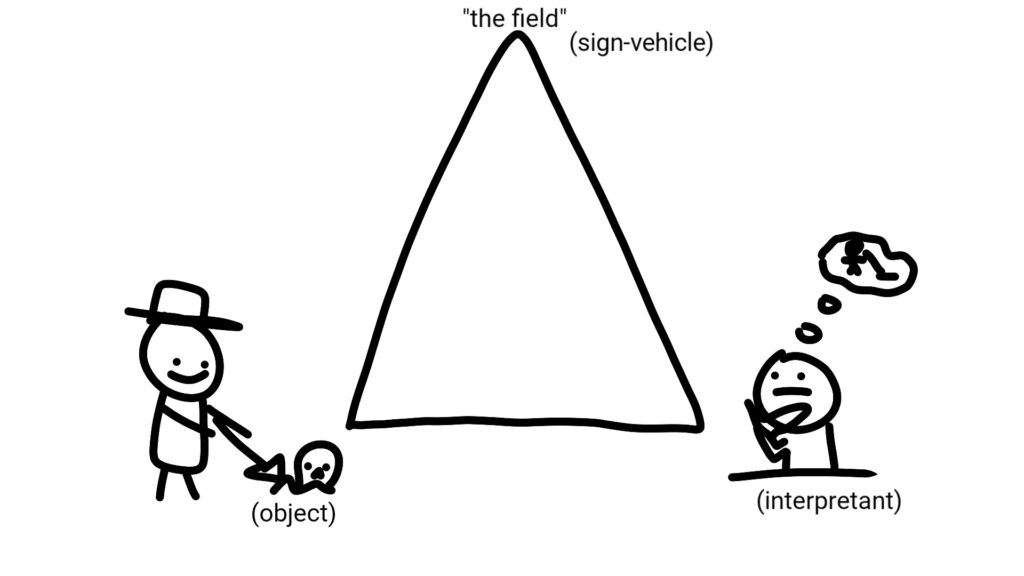
I don’t have a solution, or even answers to my many questions, but I do have a plan. It involves using whatever leverage I have to challenge the structural forces that reinforce essentialist and narrow ideas about our fields of inquiry. It involves humility and open-mindedness in the face of an anthropology that doesn’t look like mine but, because it was formed in the crucible of these troubling and troubled times, could take us all somewhere completely new.
Peirce, Charles Sanders. 1994. Division of Signs. In The Collected Papers of Charles Sanders Peirce. Electronic edition.
Atkin, Albert. 2013. Peirce’s Theory of Signs In The Stanford Encyclopedia of Philosophy, Edward N. Zalta (ed.), URL = <https://plato.stanford.edu/archives/sum2013/entries/peirce-semiotics/>
Field Work and Futures During the Coronavirus “Anthropause” [1]
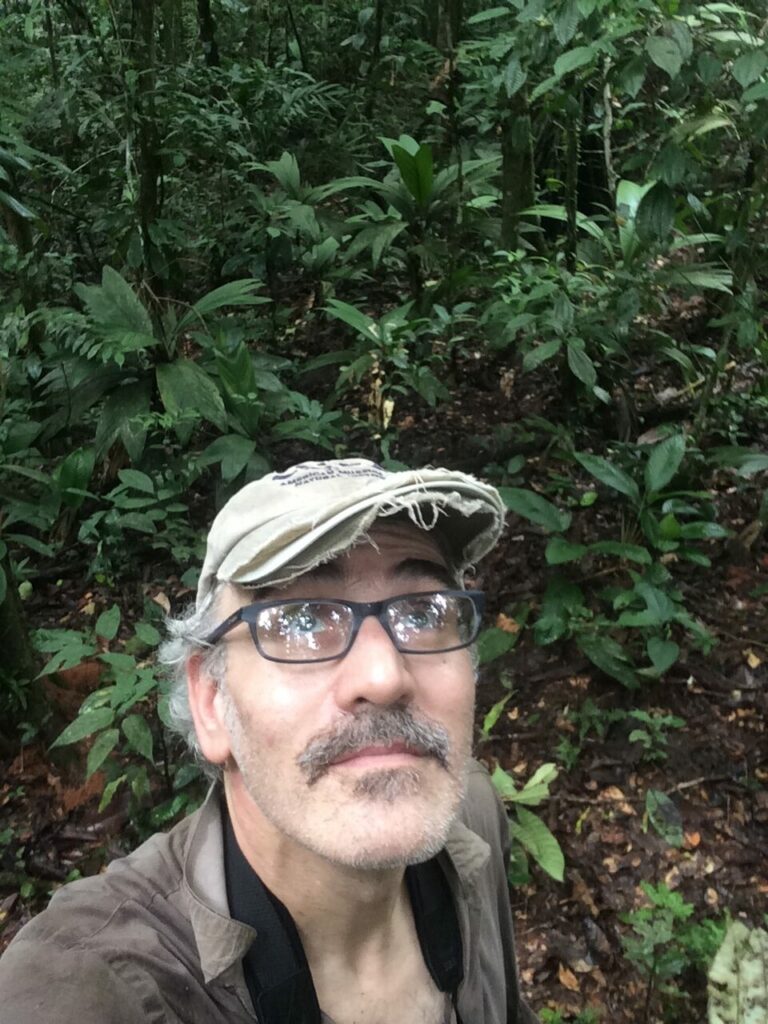
The global coronavirus pandemic is forcing people around the world to rethink almost every aspect of our daily lives, social interactions, and livelihoods. Unsurprisingly, for many academic researchers – and maybe particularly for faculty and students in Anthropology – this moment is prompting introspection about the “point” of our projects. (Is research about anything other than the virus and how it intersects with human biology and culture really that important or even relevant?) It is also challenging us to confront certain ethical issues head on. (How might my presence impact the health of people and wildlife in the regions where I am working?). On a practical level, too, we are being forced to wrestle with how to continue to make “progress” on our scholarship in the face of uncertainty about the future.
For primatologists, paleontologists, archaeologists, and human biologists whose work involves field work and field training, there is little doubt that the present crisis is going to have an outsized impact on our research programs. With travel curtailed, social distancing measures and quarantines in place around the globe, and universities and funding agencies placing restrictions on how and when even already-allocated funding can be used, many of us are now precluded from visiting research stations and excavation sites, from running or attending field schools, and from participating in any but virtual conferences. Additionally, access to many libraries and museums, both in our home countries and abroad, is suspended as those institutions grapple with their own challenges for weathering the pandemic and for keeping staff and collections safe. Even more important than these tangible, bureaucratic restrictions, though, is the fact that ethical concerns about the health and safety of our interlocuters and collaborators and of local wildlife populations demand that we pause and reevaluate any sort of field work – particularly field work taking place in remote sites or in places where the public health infrastructure is limited – as researchers are potential vectors, who could spread the virus far beyond urban centers into vulnerable populations and ecosystems.
Some forms of research in biological anthropology and archaeology might be possible to sustain, even if, as looks to be the case, much field work remains curtailed into the foreseeable future. For many of us, our research involves analyzing physical materials – bones, fossils, artifacts, biological samples, soils – that were collected in prior field seasons. In some institutions, labs that were shut down at the start of the pandemic are now beginning to “open up”, so it may be possible for work with these materials to begin again. Still, restarting “bench” research is contingent upon the development of adequate plans for safeguarding and monitoring the health of personnel (and on approvals from institutional review boards) and also requires that PPE and other lab safety supplies and consumables can be procured consistently and predictably, which may pose logistical challenges. Other kinds of non-field-based research, such as bioinformatics work or modeling studies or comparative analyses involving existing datasets, may be easier to pivot to, but only if researchers can access relevant datasets, training, and information infrastructures.
In considering how the coronavirus pandemic is likely to impact anthropological research and the discipline itself over the coming months and year, we need to acknowledge and conscientiously address two important issues. First, the ability to “restart” a research project, or to pivot a research program towards addressing questions and using methods that are viable even when we cannot travel internationally, is a privilege that is likely to extend only to select members of our community, e.g., to established researchers with existing labs and funding or to those with access to robust university supply chains for procuring PPE, reagents, and consumables. Thus, even where lab or remote research can proceed, we are likely to see many international students, visiting scholars, and undergraduates being cut off from research opportunities. Unless we find ways to push back, the situation is likely to perpetuate and exaggerate structural inequalities associated with the colonial history of academic research and narrow the diversity of experiences and scholarly approaches represented in our institutions.
Second, it is clear that the costs imposed by the current pandemic are going to be differentially experienced by folks at different stages of their careers. Unquestionably, it will be more challenging and more professionally risky for graduate students, post-docs, and junior faculty members to have their academic trajectories slowed or to have to pivot their research to embrace new topics and new methods than it will be for more senior researchers with existing labs and funding. Just as we saw with the shift to virtual instruction and remote work spurred by the pandemic, students and faculty with young children are likely to bear the brunt of disruptions to public school schedules and shrinking childcare options that limit the time that can be devoted to learning and deploying new research skills. It will be important for us to hold our departments and institutions accountable for supporting our students and junior colleagues and ensuring they are treated equitably in promotion and granting decisions.
Finally, like many others, at the height of the lockdown I was struck by reports of how much less impact humans, writ large, were having on the natural world in conspicuous ways. We saw pictures from around the globe of clearer skies over urban centers, heard about how much global CO2 admissions had fallen, and, here in the US, read accounts of wildlife running around the streets of San Francisco, Seattle, and Austin. As a wildlife biologist, it was incredibly uplifting to see these small examples of resilience during the “anthropause” (Rutz et al. 2020), though it is sad that it took humans sitting so thoroughly still and not touching the world around us to appreciate the extent to which our just being impacts the rest of the planet. As we eventually emerge from the coronavirus crisis, this effect, unfortunately, is going to fade. If there is any new direction towards which we should be turning our ethnographic research tools as a result of the pandemic, it is to the interconnectedness of humans with other organisms and actors in our ecosystem.
I love this word… it just entered our vernacular on June 22nd in a commentary published in Nature Ecology & Evolution.
Rutz C, Loretto M-C, Bates AE, Davidson SC, Duarte CM, Jetz W, Johnson M, Kato A, Kays R, Mueller T, Primack RB, Ropert-Coudert Y, Tucker MA, Wikelski M, & Cagnacci F (2020). COVID-19 lockdown allows researchers to quantify the effects of human activity on wildlife. Nature Ecology & Evolution. https://doi.org/10.1038/s41559-020-1237-z
Doing Archaeology in the Age of Covid
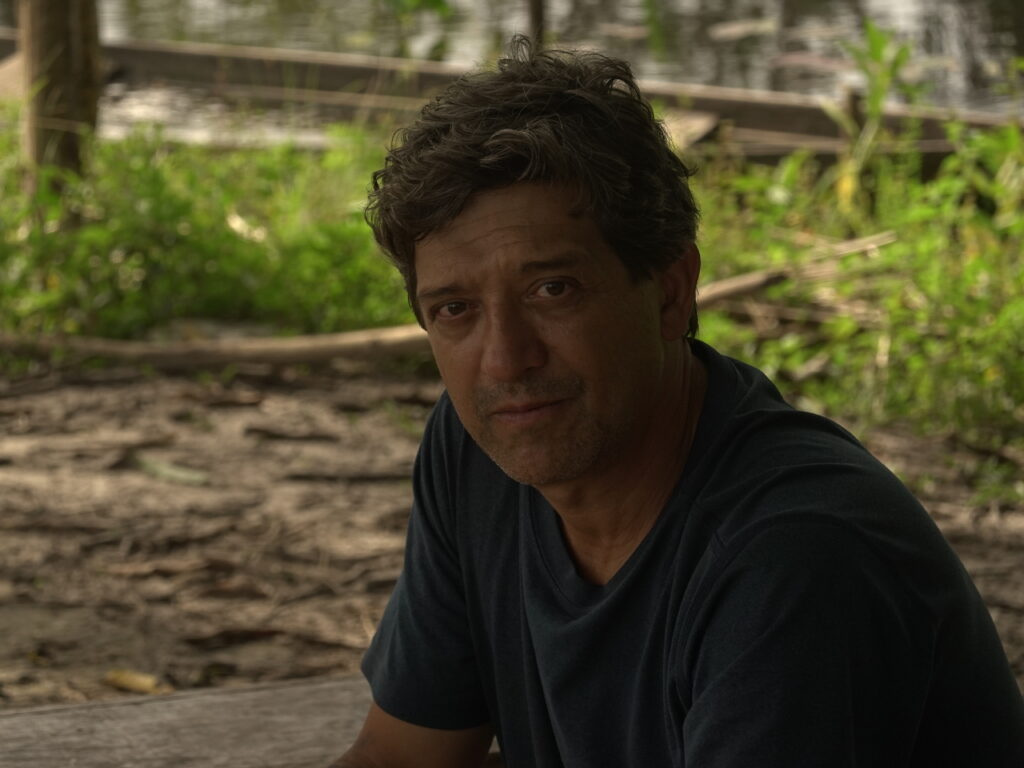
The practice of archaeology has been changing a lot in the last years, and it is likely that the current pandemic will have major consequences that will further accelerate these changes. Archaeology is a costly endeavor, and overall in the world one sees a drastic reduction in funding from public and private non-profit agencies. Such cuts parallel changes in legislation aiming at decreasing the demand for contract or commercial archaeology, which is the larger employer in the field overall. To top this, the constant flow of young PhDs coming out of universities delivers a population of young academics that is larger than the number of teaching or research positions being opened.
The colonialist history and the colonialist-embedded practices of archaeology have never been so visible as they are today. As a consequence, archaeologists’ monopoly on producing narratives about the past has been challenged by other interest groups that include Indigenous people, local communities, and local governments. This movement is forcing the discipline to move from within the limits of academia and to establish critical dialogues with these groups. As a consequence, albeit still a valid pursuit, the goal of knowing the past from its own sake is becoming harder to sustain, especially in contexts where archaeologists work among impoverished, politically silenced, and marginal communities.
The irony is that archaeology has never been so interesting as a discipline at it is today. The contribution of techniques from areas such as genomics, isotope chemistry, air-born digital imagery, and big data analyzes has been producing a small revolution in the understanding of the past through the material record. Together with the influence of innovative social theories, these advances confer to archaeology a powerful voice to propose alternative narratives about the past that challenge long-held but never-tested hypotheses. Such power derives also from the position that archaeology occupies between the social and the natural sciences. Long seen as a source of epistemological insecurity, this sometimes ambiguous place gives archaeology a privileged window on the deep history of the relationship among people, other beings, and the environment, making it well prepared to participate in the current debate on the socioenvironmental crises the world faces today.
In light of these ideas, these are the reflections I have to offer on the topics raised by Danilyn and Yael:
Methods and Questions
Restrictions on travel and lack of funding will likely render the practice of archaeology even more virtual and removed from fieldwork, particularly in graduate programs that place strict time limits on the completion of dissertations (probably more common in places such as UK than in the US). Remote analyses will become more frequent and so will approaches such as modelling or big-data analyzes. These are welcome developments but they run the risk of widening ever more the gap between the centers of production of knowledge in the global north and south, in contexts in which the north provides the syntheses (“the goods”) and the south the data (“the raw materials”). Funding for these approaches should somehow encourage stronger and more organic forms of collaboration among scholars and students, financing, for instance the travelling of students from the south to the north to enhance part of their training while remote research is done.
Methods and Ethics
The high costs involved in funding archaeology have always meant that the capacity to ask research questions and define research agendas rests with those in positions of power and reflects asymmetries in archaeology. The context of the pandemic forces one even more to question those who establish research questions and to what extent these questions contribute to making the practice of archaeology more socially relevant. In many places, such as in the Amazon where I work, local populations are the ones being hit hardest by Covid-19, and one should question the relevance of doing traditional fieldwork in places that have been devastated by the pandemic. That means opening the discipline even more to honest and practical dialogues about who benefits from archaeology and allowing for greater flexibility to modify proposed research goals once one is in the field.
Ethics and Questions
The most important question an archaeologist should always ask is, why am I doing this? This question should perhaps be the first one addressed by people applying for grants, and the answer should not be only scientific or academic. Once more, the practice of archaeology involves high costs, long distance trips, and, in many cases, literally messing around in people’s backyards. The transportation of samples to laboratories or museums, sometimes far away from the places where they were uncovered, is another complicated and costly ordeal. Archaeology must find a way to somehow be relevant in addressing the political and social problems the world faces today. Doing this will force the discipline more self-critical and interesting.
A final suggestion. The practice of archaeology is a collective endeavor and historically highly dependent on fieldwork. Although the frequency and opportunities may get more restricted due to limitations on travelling and funding, fieldwork will remain a basic pillar of the discipline. Over twenty years, my experience teaching free-of-charge field schools in the Brazilian Amazon has shown me that these are wonderful opportunities to form networks of students, build a sense of comradery, and empower local archaeologists and other people interested in the past. I think that opportunities for funding multi-year field schools or field workshops could have an important impact on the further development of the discipline in these critical times.
COVID-19 and the “New World” Order
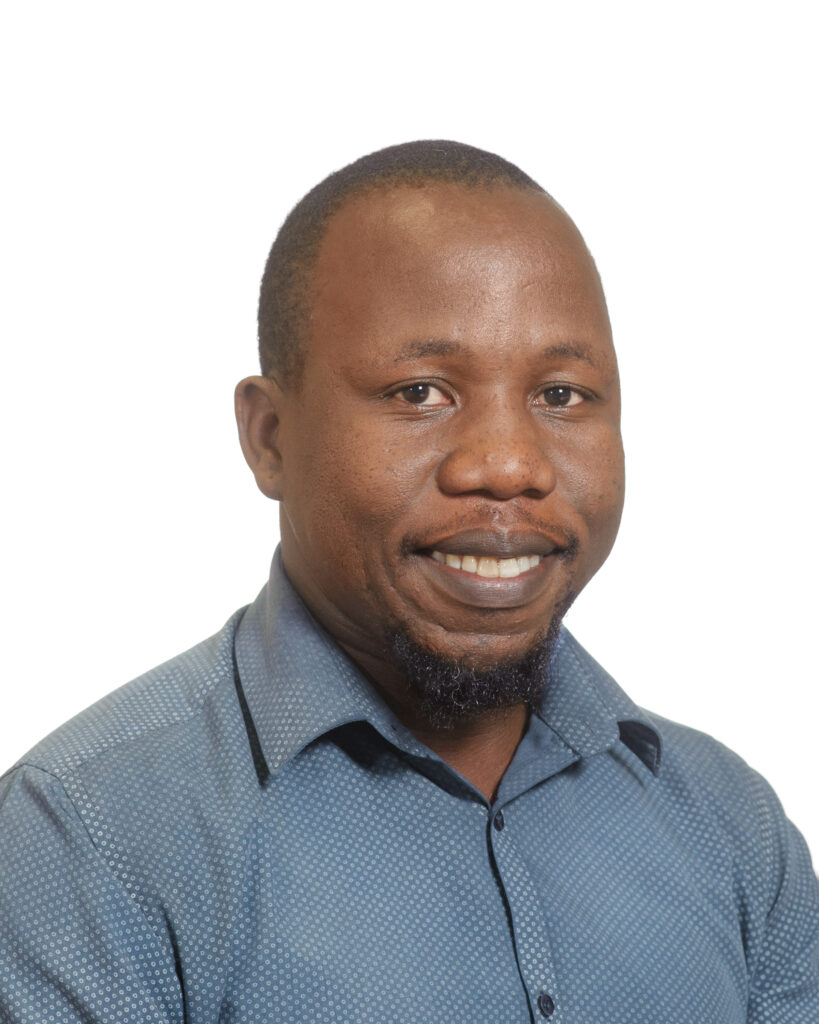
It is “normal” to live in a world facing challenges of various kinds as a result of social injustice, colonialism, climate change, conflict, or medical inadequacies. Such challenges are often geographically defined and do not necessarily affect the whole globe at once. I always consider these occurrences to be short-term disturbances of the equilibrium to which we have become accustomed as humans living in specific geographical locations around the world. As human beings, we all have experienced challenges that somehow disturb our “normality.” But a significant majority of the world population has not experienced a phenomenon in our living memory that has caused as much disruption as COVID-19. We, therefore, do not have any experience to guide us in adapting to the world in which we find ourselves. As we reflect on how COVID-19 is affecting our lives, personally and professionally, a number of issues come to the fore. I focus on three factors to review how the pandemic is challenging us to rethink our approach in terms of how we conduct our research activities. These are (i) research questions and methods, (ii) research methods and ethics, and (iii) ethics and research questions.
Research Questions and Methods
My view is that COVID-19 has significantly affected research activities, and this shall continue to be the case for some time. I am not convinced that any anthropological or archaeological research can take place under the prevailing circumstances. This is the case even though the COVID-19’s impact differs across the world, with some countries significantly less affected than others.
While there might be research questions that explore how people, especially indigenous communities, are responding to life under the pandemic, I am not convinced the situation allows for anthropological and archaeological research activities. It is very insensitive to be “throwing” research questions at people who are faced with the most difficult circumstances in their living memory. It is my considered view that those who insist on undertaking any research activity under the pandemic are simply interested in their “academic” output, in churning out “quick” publications. I do not attach much regard to anthropological COVID-19-related research because of the circumstances under which it is gathered and the methods applied. Those who continue insisting on research activities do so without being considerate of the societies within which they collect research data.
In discussion with colleagues, it emerged that the presence of outsiders can be viewed as a threat through which people from the “cities” are bringing the pandemic closer to their study areas, which are largely in rural localities. As we know, the major economic hubs around the world are ravaged by COVID-19. Our thinking was that our “foreignness” would affect how people interact with us, resulting in a discomfort that would directly affect research outcomes. To stand in solidarity with the most affected communities, it is my view that we should not conduct any anthropological and archaeological research activities, whatever our research methods may be. This is my view even where our methods dictate that the data is to be collected by various local members of the societies we are researching. This is not an ideal time for research. Instead, we must be compassionate with the most affected people from the various areas where we conduct our research projects.
Research Methods and Ethics
Our research context, even before the outbreak of COVID-19, was already defined by a number of concerns expressed especially by scholars based in so-called developing nations. Some researchers have “silently” argued against the increasing presence of foreign teams in their countries. Their charge is that such teams do not apply the same ethical standards they always promise to abide by. In addition, foreign research teams are accused of not investing in developing local collaborators so that they can themselves become active researchers who can stand on their own. These local collaborators exist only in the shadows of their “barons.” It could be argued, therefore, that local collaborators are simply involved to fulfill a “political” mandate and satisfy government administrative requirements for research permits. What this illustrates, therefore, is that the major intention behind these collaborations is not to significantly develop research capacity in so-called developing countries. The unspoken goal, instead, is to keep the status quo in place so that the area involved can remain “continuously fertile” for research by foreigners. This says a lot about who is actually producing knowledge, with others left to consume knowledge produced within their areas by outsiders.
The outbreak of the pandemic gives us a moment of “pause” in which to reflect upon and revise such relationships, which are abusive of local collaborators who are used only to get research funding and research permits within specific localities. I even have had foreign-based colleagues use my name as a collaborator without ever contacting me. Even to this day, these colleagues have not had the decency to say anything to me about these research projects (in which I was supposedly involved). It gets even worse than this, and yet the greater majority of my African colleagues would not have the courage to speak out and challenge these kinds of relationships.
More importantly, I believe COVID-19 has clearly illustrated how we have failed to transform our disciplines. It is evident that while we have researched and over-researched some communities around the world for many years, we have not done enough for these communities for them to have any of their own become trained specialists who can stand by themselves and run big research projects. I am not necessarily arguing there are no such instances within the African continent, but my view is that they are too few considering how much anthropological research has been conducted on the continent. How many indigenous professionals are actively producing knowledge in our research fields such that we can say that a meaningful transformation, and not just a smokescreen, is taking place? I have seen other colleagues beginning to add their informants as co-authors in research publications, but for me, this is not enough of a transformation nor can I even begin to consider it as such. COVID-19 is thus highlighting the growing gap of inequality not only in our broader societies but within our very own academic disciplines. It is ethically clear to me, therefore, that we need to transform the production of knowledge. The equality that researchers are supposedly aiming for is still only a pipe dream. Researchers make politically correct statements, but it simply ends there. Foreign researchers have always led the game and played it with their research subjects by their rules.
Ethics and Research Questions
The greatest challenge is that our training of students has not really changed over the years. As a result, researchers and their students are not as compassionate as they ought to be. Indeed, we have adapted our language to a certain extent. It is now common to talk of community archeology, public archaeology, postcolonial archaeology, and so on. I would argue that, to a large extent, this is enforced upon us by the need to be politically correct as well as what I call the “feel good factor.” This is a good approach for pleasing potential funders, but the reality is that our practice is very different. We need to step back and reflect on the manner in which we have been dealing with our research subjects and the nature of the knowledge we have produced over the years.
In addition, anthropological and archaeological researchers have, in my view, become “victims” of the expectation that their research must be both objective and considerate of their informants. The two goals are contradictory in my opinion. Being considerate means being biased, and that is not objectivity. It has never been my view that objectivity is achievable under any research circumstances. As researchers, our identity plays an active role in our research projects, and we should accept that. My thinking is that we should stop trying to achieve the impossible, since we cannot distance ourselves from who we are, which is shaped by our various social, economic, religious, and political experiences. Researchers must begin seeing themselves in their projects, and this begins with them taking ownership of the voice in which they write their publications. It has been academic tendency for researchers to hide their subjectivity behind the use of the third person when they write up their research findings.
Reflecting back on these three factors (research questions and methods, research methods and ethics, and ethics and research questions), it is evident that anthropological and archaeological disciplines must still continue with their transformative efforts. The COVID-19 pandemic is an opportunity to stop and reflect on the road traveled thus far before some “normality” returns. It is my expectation that it will take another year or so for this to happen. What is most important is that our research projects must be meaningful to the communities within which we work. Our research questions, therefore, should always not just be informed by our project’s intentions, but also by the difference our findings are likely to make in the lives of our respondents. We need to throw away the unachievable goal of objectivity and actively embrace subjectivity. That will not necessarily mean that we are unethical, but it will go a long way towards enabling us to be successful in making our research projects relevant.
What does an Ethical Physical Anthropology Look Like in a Global Pandemic?
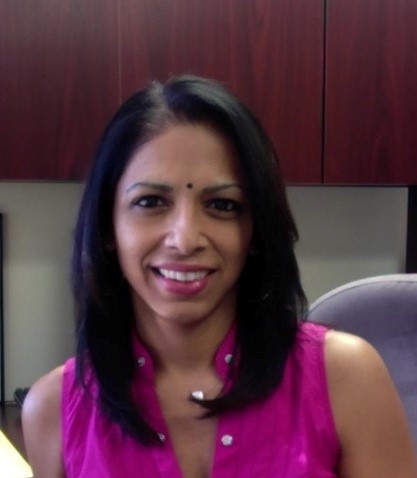
Recently my senior graduate student Brittany reminded me that I once told her: “one of the most powerful contributions anthropologists can make is to dictate the narrative of human history.” This was said as a cautionary statement—an acknowledgement that we exercise a privilege, power, and voice with whatever we publish and thus we have to do so mindfully. Brittany’s reminder came at an especially poignant time. Just days after Danilyn invited me to consider anthropological ethics in a post-pandemic world, George Floyd was murdered. The African-American community was burdened to call on us yet again, for the nth time, to acknowledge and at least start to repair the centuries of pain and damage inflicted by slavery, colonialism, and imperialism. So when our roundtable group finally met, we inevitably could not disentangle our discussion from the bigger-picture ethics of anthropology in a world where institutional structures that have already shifted once because of COVID-19 need to shift again.
So here I share my thoughts on what an ethical Physical Anthropology would look like that accounts for the changes we all face due to the pandemic, but that goes beyond focusing on the immediate issues of travel restrictions, precautions when visiting museums or research collections, and lost training opportunities for students. Our work takes place within a historically mediated global power structure. Physical anthropology (in the strict sense) was built on the violent acquisition of human bodies, on their objectification and dehumanization, and on using them to rationalize colonialist and genocidal policies. I, my students and my closest colleagues work primarily with skeletal collections housed in museums around the world and derived from this violent history. There have always been ethical issues surrounding the study of these materials, so the need for new ways to conduct research in a world transformed by the pandemic dovetails well with the opportunity to implement more ethical practices using these data.
Before the roundtable discussion I asked my junior colleague Cody Prang, and my three graduate students Brittany Moody, Harshita Jain, and Missy Gandarilla to share their perspectives, fears for the future, and ideas for moving forward. Many of us recognize that we are not faced with the massive and possibly permanent losses in data collection methods that other anthropologists face. Our work can proceed despite the many restrictions of the COVID-19 pandemic thanks to remote technology. While there is no substitute for physically handling bones for a comparative anatomist or morphologist, we can still address many of our questions using some form of online data such as 3D surface scans, CT scans, and/or existing datasets (à la Howells and Hanihara). Students are still stressed out about how to revise their projects, but they are not completely abandoning them in large numbers the way that many of our colleagues in other sub-fields—and even within Biological Anthropology broadly— are.
I paint the cup for Physical Anthropologists as half full out of respect to our colleagues whose work simply cannot be done remotely. But the reality is that we are in no way ready to pivot to this “simple” solution of online data. Our community knows this, and it will be a long road for us to get there. But failing to do that will be a massive failure of our generation to future generations of scholars.
The biggest obstacle we face is that physical anthropologists (and I am not innocent in this) are notorious for our resistance to providing access to our data, and our tendency to monopolize it indefinitely in the name of “ongoing study.” This unintentionally but unforgivably reproduces a premise at the origins of our subfield: the idea that we “own” the bodies we study. Indeed, John Hawks points out that the term “sharing” invokes an act of charity as opposed to a healthy and even essential scientific practice that allows for replication and repeatability.
The resistance to providing public access to data in my subspecialty of paleoanthropology has also created clubs of “haves” and “have nots.” Eager new graduate students with creative projects often struggle with implementing their ideas and getting funding because they are at the wrong institution or work with the wrong advisor to get access to data that they should rightfully have. This usually correlates directly with access to economic resources. It is impossible to diversify our field when data access exists along these axes of privilege which are reinforced in such deep structural ways.
Requiring the deposition of data into a public database, as is done by the National Institutes of Health, would be an important step forward for our subfield, and many senior scholars have been calling for this for a while (e.g., Turner 2005; Turner and Mulligan 2020). Our field has been discussing the ethics, practicalities, and considerations of such practices (e.g. Weber 2001, 2015) for over a decade, but without significant change. Funding agencies such as Wenner-Gren and NSF could play a major role in forcing a cultural shift by implementing strict accountability mechanisms such as requiring a detailed timeline for data deposition into a public repository, constructing and overseeing data repositories, denying additional funding, or even revoking funding, as is done by other organizations. These requirements would serve to signal the massive importance of data sharing, particularly in a post-pandemic research landscape, and begin to dismantle the tradition of Western scientific ownership over biological data derived from human bodies.
But on the flip side, as powerfully noted by Rick Smith and Jess Kolopenuk (forthcoming), requiring data sharing has its own colonial overtones. All people, but especially historically marginalized populations, are entitled to sovereignty over their biological data and their ancestor’s bodies. In that respect, our Black, Indigenous, and international partners require consultation on this matter; it is not as simple as a field-wide mandate.
Relying heavily on virtual data would also impact our museum and university partners because it would shift how we fund infrastructure and capacity building, particularly within international institutions. Many museums and universities charge bench fees, which are critical to the financial health of their staff’s own research and ability to curate the materials safely. If we emphasize data collection using online databases, funding agencies and scholars could incorporate budgetary line items that provide support for the personnel and technology needed to scan collections and construct/oversee online databases, perhaps replacing bench fees with the payment of comparable fees to access these virtual collections
It may be inevitable for us to default to focusing on lab-based research (such as genomics) when we are restricted for ethical reasons from doing fieldwork. But as one of our roundtable participants, Eduardo Neves, pointed out beautifully, if we shift our focus too much in this direction we are in a sense re-colonizing our field. If poor countries are not provided the capacity building support that is required to participate in these remote discussions, then we are inevitably shifting the power of narrating our past to a few predominantly White researchers. This ties back into what I told Brittany. If we do indeed have the power to narrate human history, I hope we can use this transformational period to shift resources, and authorship, to historically marginalized voices.
Turner, Trudy R., ed. Biological anthropology and ethics: From repatriation to genetic identity. SUNY Press, 2005.
Turner, Trudy R., and Connie J. Mulligan. “Data sharing in biological anthropology: Guiding principles and best practices.” American journal of physical anthropology 170, no. 1 (2019): 3-4.
Weber, Gerhard W. “Virtual anthropology (VA): a call for glasnost in paleoanthropology.” The Anatomical Record: An Official Publication of the American Association of Anatomists 265, no. 4 (2001): 193-201.
Weber, Gerhard W. “Virtual anthropology.” American journal of physical anthropology 156 (2015): 22-42.